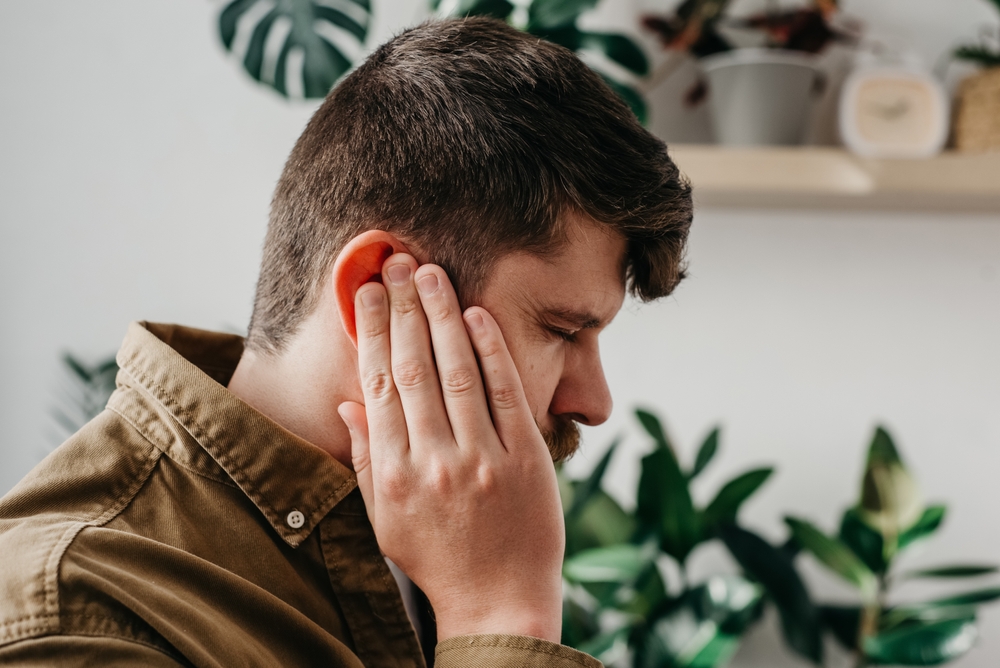In the movies, invisibility is a potent tool. Whether it’s a mud-covered hero, a cloaked starship, or a stealthy ninja, invisibility allows people in movies to be more effective and, often, accomplish the impossible.
Unfortunately, invisible health conditions are no less potent…and they’re a lot less fun. Tinnitus, for example, is an incredibly common condition that impacts the ears. But there are no outward symptoms–it doesn’t matter how well you look. Tinnitus is as invisible as Arnold Swartzenegger at the end of Predator (he was covered in mud, so the bad alien couldn’t see him… look, the metaphor works here).
But just because it’s invisible doesn’t mean tinnitus doesn’t cause a significant impact on those who experience symptoms.
What is tinnitus?
So we know one thing: you can’t see tinnitus. In fact, tinnitus is a condition of the ears–which means most symptoms are auditory in nature. You know that ringing in your ears you sometimes hear after a rock concert or in a really quiet room? That’s tinnitus. Now, tinnitus is pretty common (something like 25 million people experience tinnitus every year).
While ringing is the most common presentation of tinnitus, it’s not the only one. Some people may hear buzzing, crunching, metallic noises–all kinds of things. The common denominator is that anyone who has tinnitus is hearing sounds that are not really there.
For most people, tinnitus will be a temporary affair–it will come and go very quickly. But for somewhere between 2-5 million people, tinnitus is a chronic, sometimes debilitating condition. Think about it like this: hearing that ringing in your ears for five or ten minutes is annoying, but you can distract yourself easily and move on. But what if that sound never goes away? It’s easy to imagine how that might begin to significantly impact your quality of life.
What causes tinnitus?
Have you ever had a headache and tried to narrow down the cause? Maybe it’s stress; maybe you’re getting a cold; maybe it’s allergies. The trouble is that lots of issues can cause headaches! The same is also true of tinnitus–though the symptoms may be common, the causes are widespread.
Sometimes it might be really obvious what’s causing your tinnitus symptoms. In other cases, you may never truly know. In general, however, tinnitus may be caused by the following:
- Colds or allergies: If a lot of mucus backs up in your ears, it may cause some inflammation. And this inflammation can cause tinnitus.
- Head or neck injuries: Your head is pretty sensitive! So head injuries–especially traumatic brain injuries (including concussions)–can end up causing tinnitus symptoms.
- Certain medications: Some over the counter or prescription medications can cause you to hear ringing in your ears. Usually, that ringing subsides once you stop taking the medication in question.
- Ear infections or other blockages: Just like a cold or seasonal allergies, ear infections and other blockages can cause inflammation in the ear canal. As a result, your ears can start ringing.
- Noise damage: Damage from loud noises can, over time, cause tinnitus symptoms to develop. This is so common that loud noises are one of the leading causes of tinnitus! The best way to prevent this kind of tinnitus is to avoid overly loud places (or wear hearing protection if avoidance isn’t possible).
- Hearing loss: Hearing loss and tinnitus are often closely associated. In part, that’s because noise damage can also be a direct contributor to sensorineural hearing loss. In other words, they both have the same cause. But hearing loss can also exacerbate tinnitus–when the rest of the world seems quieter, that ringing in your ears can become louder.
- Meniere’s Disease: This is a disorder of the inner ear that can cause a wide range of symptoms. Among the first symptoms, however, are typically dizziness and tinnitus. Over time, Meniere’s disease can cause permanent hearing loss.
- High blood pressure: For some people, tinnitus may be the result of high blood pressure. If this is the case, it’s a good idea to check with your primary care provider in order to help control your blood pressure.
If you’re able to determine the cause of your tinnitus, treatment may become easier. For example, if an earwax blockage is causing ringing in your ears, clearing out that earwax can relieve your symptoms. Some people, however, may never know what causes their tinnitus symptoms.
How is tinnitus diagnosed?
If you have ringing in your ears for a few minutes and then it goes away, it’s not really something that needs to be diagnosed (unless it happens frequently). That said, it’s never a bad idea to check in with your hearing specialist to schedule a hearing screening.
However, if your tinnitus won’t go away or keeps coming back, you should schedule some time with a hearing specialist to get to the bottom of it (or at least start treatment). A hearing specialist will perform a hearing exam, talk to you about your symptoms and how they’re impacting your life, and maybe even discuss your medical history. All of that information will be used to diagnose your symptoms.
How is tinnitus treated?
Tinnitus is not a condition that can be cured. But it can be treated and it can be managed.
If your tinnitus is caused by an underlying condition, such as an ear infection or a medication you’re taking, then address that underlying condition will lead to an improvement in your symptoms. However, if you have chronic tinnitus, there will be no underlying condition that can be easily fixed.
For those with chronic tinnitus then, the goal is to manage your symptoms and help ensure your tinnitus does not negatively impact your quality of life.. There are many things that your hearing specialist can do to help. Among the most common are the following:
- Cognitive behavioral therapy: Your hearing specialist may refer you to another provider for cognitive behavior therapy. This is a therapeutic approach designed to help you not notice the ringing in your ears.
- A masking device: This is a device much like a hearing aid–except instead of amplifying sounds, it masks sound. These devices can be calibrated to your unique tinnitus symptoms, creating just enough sound to make that ringing or buzzing significantly less noticeable.
- A hearing aid: Sometimes, tinnitus becomes noticeable because your hearing loss is making everything else comparatively quieter. In these cases, a hearing aid can help turn the volume up on the rest of the world–and drown out the buzzing or ringing you may be hearing from your tinnitus.
Your hearing specialist will develop a personalized and unique treatment plan for you and your tinnitus. The goal will be to help you manage your symptoms so that you can get back to enjoying your life!
What should you do if you think you have tinnitus?
Tinnitus might be invisible–but the least thing you should do is pretend it isn’t there. Chances are, those symptoms will only grow worse. It’s better to get ahead of your symptoms because you may be able to prevent them from growing worse. At the very least, you should invest in hearing protection for your ears–make sure you’re wearing ear plugs or ear muffs whenever you are around loud noises.
If you have tinnitus that won’t go away (or keeps coming back) schedule an appointment with a hearing specialist to get a diagnosis.



